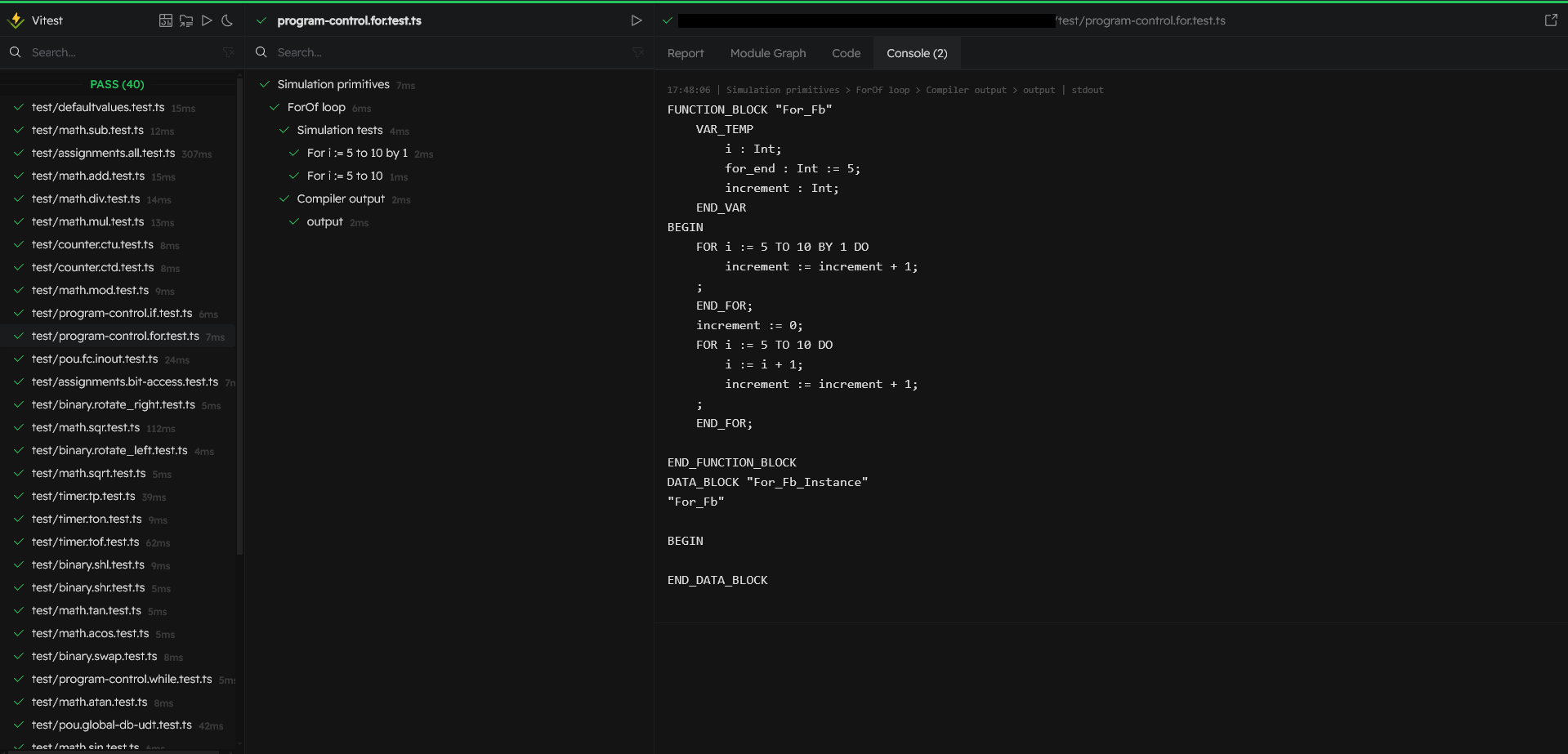Vitest
You can use Vitest to check the result of all UnitTest blocks of a program.
It is possible to define multiple *.test.ts files and run all of them in parallel, each with a different instance of @vifjs/sim-node.

Integrate Vif Sim
Imports
Since we need to simulate our code, you will have to install @vifjs/sim-node.
We will also need the async executor which provides an easier way to test our code.
ts
import {describe, it} from "vitest"
import {Container} from "@vifjs/sim-node/boot"
import {Plugin} from "@vifjs/sim-node/plugin"
describe("MyTest", () => {
})Create a program
Next step we will create a small program with an unit test.
ts
import {BuildSource} from "#source";
import {Ob} from "#pou";
import {UnitTest} from "@vifjs/language-builder/operations/unit";
import {Bool} from "@vifjs/language-builder/types/primitives";
const Myprogram = BuildSource({
blocks: {
"Main": new Ob(
{
interface: {
temp: {
ThisBool: new Bool(true)
}
},
body() {
return [new UnitTest("My first unit test", this.temp.ThisBool, "=", true)]
}
}
),
},
})
describe("MyTest", () => {
})Load the container & Async executor
Now load the container and the async executor:
ts
describe("MyTest", async () => {
// Create a new Container instance and boot it
const container = new Container()
await container.boot()
// Create a new plugin and get the async executor
const plugin = new Plugin("vitest", 200)
const getExecutor = await plugin.getAsyncExecutor().init(container)
// Load the provider
await getExecutor.loadProvider(Provider.toAst());
// Load your program
await getExecutor.loadProgram(MyProgram.toAst());
})Awaits for unit tests
ts
describe("MyTest", async () => {
// Create a new Container instance and boot it
const container = new Container()
await container.boot()
// Create a new plugin and get the async executor
const plugin = new Plugin("vitest", 200)
const getExecutor = await plugin.getAsyncExecutor().init(container)
// Load the provider
await getExecutor.loadProvider(Provider.toAst());
// Load your program
await getExecutor.loadProgram(MyProgram.toAst());
// Start simulation with Main and await for unit test results
const tests = await getExecutor.startAndWaitUnitTests("Main")
tests.forEach(test => {
it(test.description, () => {
expect(test.status, test.fail_message + "\n")
.to.be.equal(UnitTestStatus.Succeed)
})
})
})TimeOut security
If you're playing with Timers or UnitBlock there's a chance that the simulation never ends.
To prevent an infinite simulation from happening, you can use the stopAfter parameter of the container.
ts
describe("MyTest", async () => {
// Create a new Container instance and boot it
const container = new Container()
await container.boot()
container.loadContainerParams({
stopAfter: 6000
})
// Create a new plugin and get the async executor
const plugin = new Plugin("vitest", 200)
const getExecutor = await plugin.getAsyncExecutor().init(container)
// Load the provider
await getExecutor.loadProvider(Provider.toAst());
// Load your program
await getExecutor.loadProgram(MyProgram.toAst());
// Start simulation with Main and await for unit test results
const tests = await getExecutor.startAndWaitUnitTests("Main")
tests.forEach(test => {
it(test.description, () => {
expect(test.status, test.fail_message + "\n")
.to.be.equal(UnitTestStatus.Succeed)
})
})
})